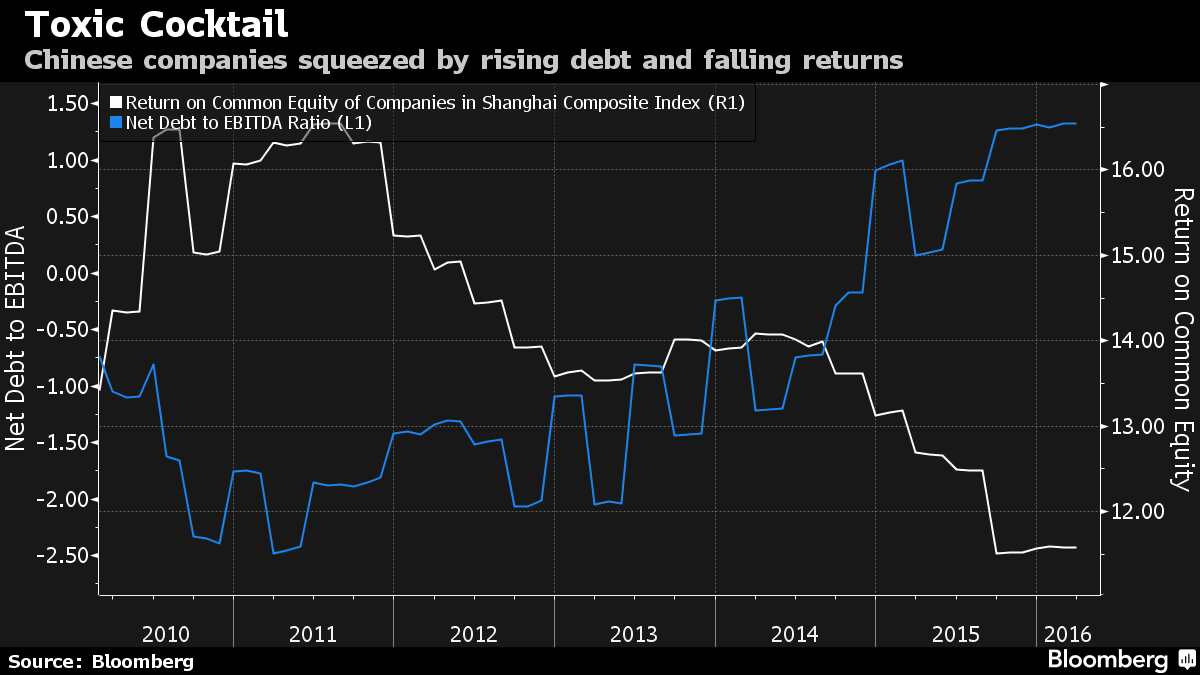Account receivable are roaring in China, up 23% over the past two year to an amazing $590 billion. In some heavy industrial sectors, the days to collect revenues have swelled to over 1,000. Overall, median collection days stand at 83, highest of all industrialized countries in the G-20, with exception to the deadbeat shoe shiners in Italy.
“It’s a big problem when you have rising insolvencies, a bad economic environment and less liquidity for small companies,” said Mahamoud Islam, the firm’s senior Asia economist in Hong Kong.
Those headwinds are increasingly visible in Chinese financial statements, where the accounts receivable and sales entries allow analysts to calculate “days sales outstanding,” or how long it takes a firm to get paid. The median collection time of 83 days, compiled by Bloomberg from the most-recent filings of mainland-domiciled firms, has climbed from 79 days in 2014 and 55 days in 2010. It’s higher than in any of the world’s 20 biggest economies except Italy, and compares with the 44-day median for companies in the MSCI Emerging Markets Index.
Chinese industrial firms take longest to convert sales into cash, at 131 days, followed by 120 days for technology companies and 118 days for telecommunications firms. While it varies by sector, a reading of more than 100 days is typically a “red flag,” said Amy Sunderland, a money manager at Grandeur Peak Global Advisors in Salt Lake City, Utah. She’s been avoiding companies in the infrastructure and environmental-protection industries in part because they’re taking too long to collect payments.
“It could indicate future cash flow problems” or that a company is booking revenues too aggressively, said Sunderland, whose Global Opportunities Fund has gained an annualized 9.4 percent over the past three years, beating 94 percent of peers tracked by Bloomberg.
The trend of longer collection periods isn’t going to end anytime soon, according to Chen Xingdong, chief China economist at BNP Paribas SA. The former World Bank official sees at least two more years of delayed payments as companies struggle to reap better terms from their customers.
“The hard time is still ahead,” he said.
Year to date, the Chinese markets are down by a mere 6%, as bullish spirits persist amidst a litany of impending bankruptcies, which are on track to jump by 20% in 2016.
If you enjoy the content at iBankCoin, please follow us on Twitter







Dang, they like dropping tidbits of truth every now and again don’t they? Pretty smart
Finding ways to either: a) not pay, or b) pay incredibly late, would appear to be the basis of many Chinese manager’s performance evaluations. This is why I no longer do business there. Not rich enough to finance the AP of enormous deadbeat China corporations.
Interesting. It could be that the Chinese pay late or not at all, not because of necessity or lack of funds, but because the market will bear it.